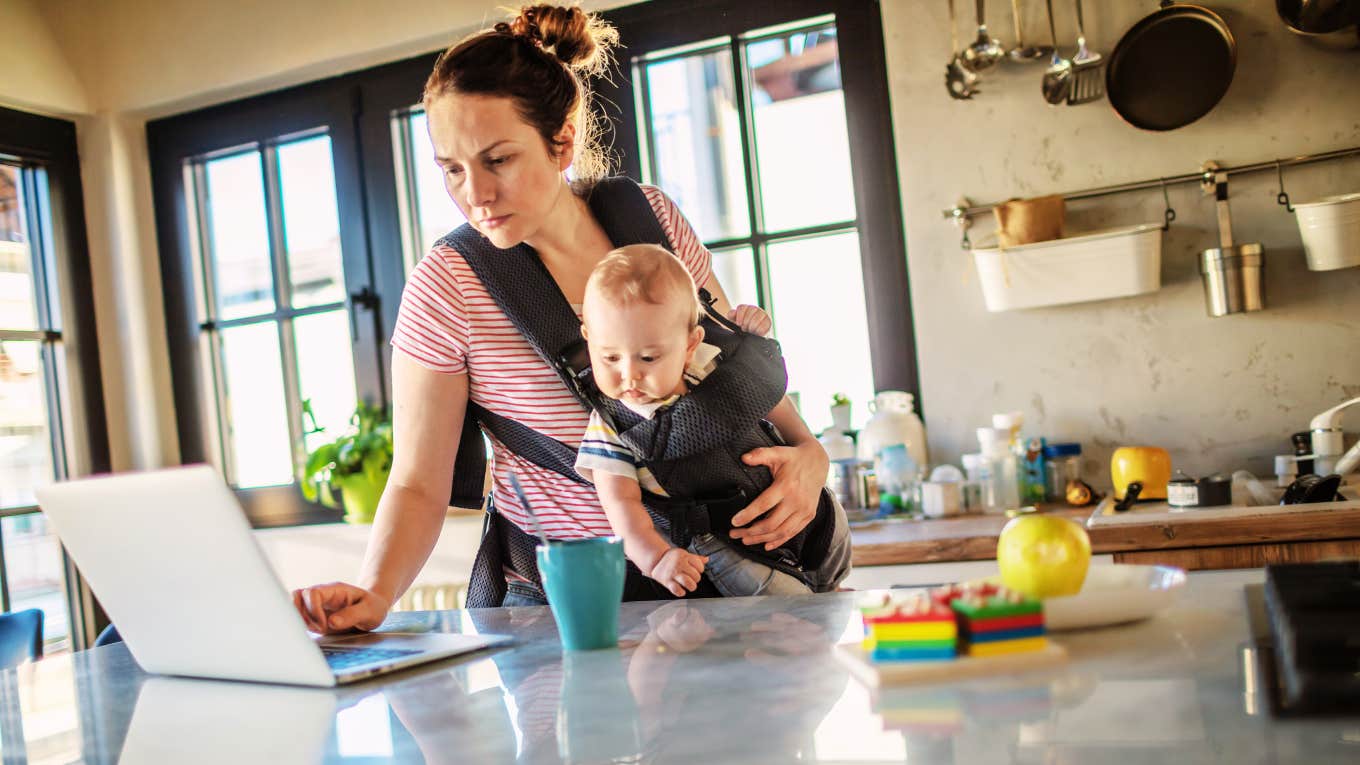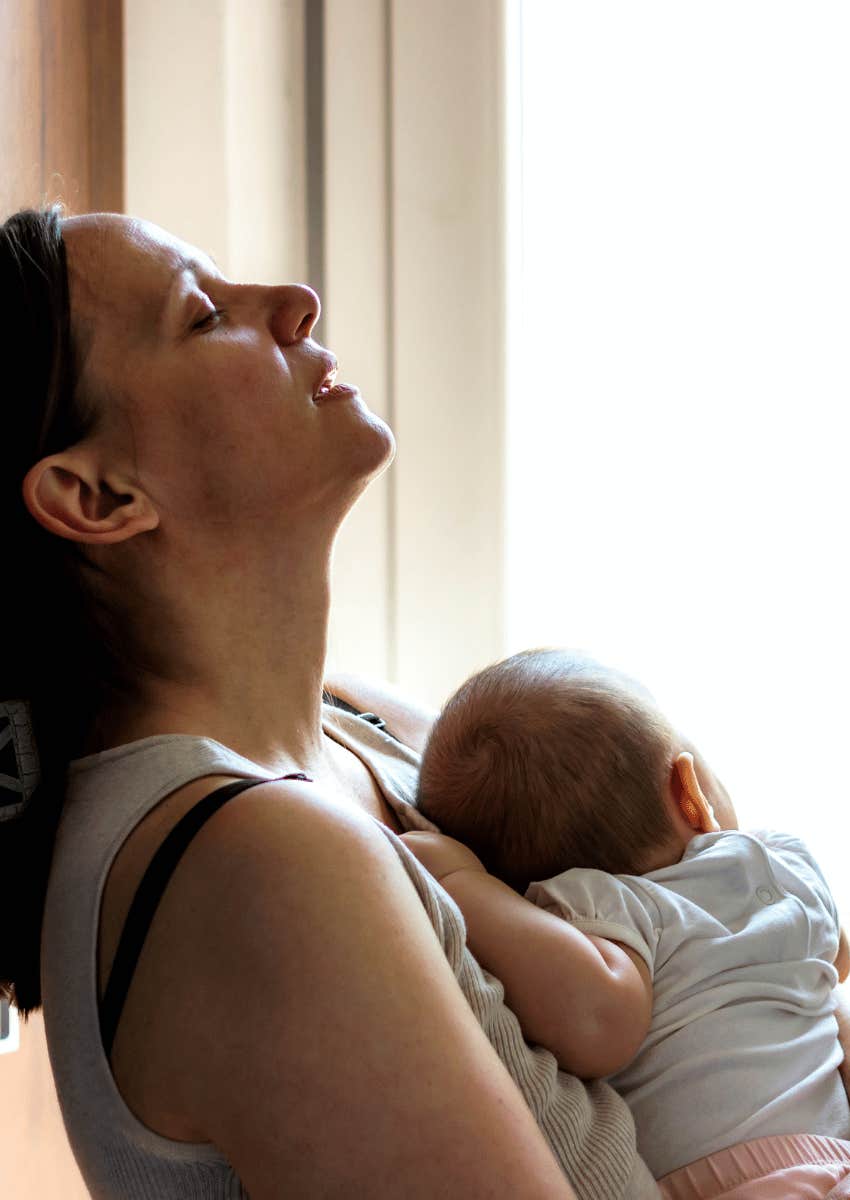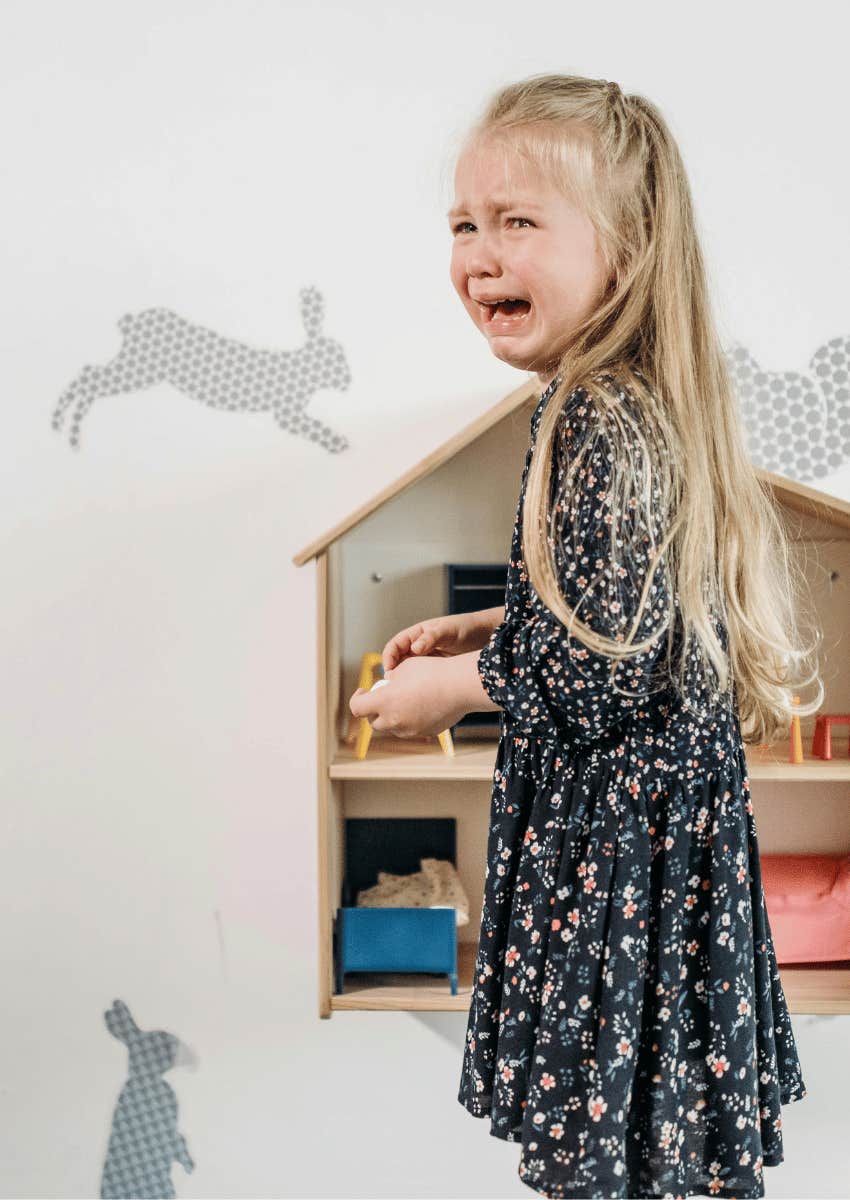The Cognitive Dissonance Of Modern Motherhood — 'I Took All My PTO For Maternity Leave And Daycare Costs More Than My Mortgage'
On reconciling my maternal instincts with a world that dismisses and denies them.
 MilosStankovic | Canva
MilosStankovic | Canva I feel like an idiot. The HR director at my job has just informed me that there are no paid maternity leave options, but that I’m entitled to 14 weeks of unpaid leave under the FMLA. “Entitled?” I think but do not say aloud.
Later, I learned that the law was specifically enacted so that women who take time off to give birth and subsequently care for a newborn don’t lose their jobs. But there is no way we’re going to pay them for that.
The HR director tells me I also will be “entitled” to six weeks of disability pay, about 60 percent of my paycheck, following the birth of my child. Later, I learned that six weeks is the amount of time that women typically need to physically recover from the act of labor.
It has nothing whatsoever to do with the needs of the newborn. When women are no longer “disabled,” of course, they can’t be expected to take free money for just sitting around with a baby.
I should have done my research and should have asked these questions sooner. I’m already pregnant, have only meager savings, and can barely afford six weeks at 60 percent pay, not to mention eight subsequent unpaid weeks.
I just assumed there would be sufficient safety nets in place to allow for what is arguably one of the most profound and important human experiences. If not from the federal government, then at least from the state government, and if not from the state government, at least from this white-collar job with “excellent” benefits.
I walk away from the meeting with my HR director feeling not only like an idiot but also profoundly shaken. It’s not just because I’ll be bleeding substantially more money than I’ve anticipated during a leave that will be substantially shorter than I’ve anticipated. It’s also because I simply cannot believe this is the way things are.
I thought that we cared about babies and mothers. I thought that surely we rallied to support them during those formative early months. I was wrong.
I end up with a C-section, which “entitles” me to eight weeks of disability benefits — an extra two weeks since being cut open makes me more disabled than squeezing a baby from my canal.
Everything in the hospital feels wrong. The surgeon is tired, distant, unsmiling. The linoleum floors are cold and gleaming, nothing like the warm wood floors at the birthing center where I’m supposed to be. I’m grateful they can yank out my breech baby, whose head is lodged beneath my ribcage, but I’m mourning the loss of the childbirth I’d hoped for.
They whisk her away, my baby, after they’ve dislodged her. I can only imagine them poking and prodding her with blue-gloved hands, peering at her with blue-masked faces under the too-bright glow of blue-tinged fluorescent lights. What a cold and unfortunate welcome into this world.
When she is in my arms, everything finally feels right, even if all around us it is still too cold and too bright. She squirms endlessly, which doesn’t surprise me because she squirmed endlessly in my belly, so much so that she turned herself feet first.
They tell me that she will sleep for several hours but I should wake her up to feed her. I do not. It’s not a willful rebellion, it’s just that I fall asleep before I get around to setting any sort of alarm. I’ve been up all night, waiting for my turn with the surgeon. I’ve just had my abdomen sliced open and a baby extracted.
We both sleep heavily for six consecutive hours. She survives. For the next two days, it seems that every nurse who comes in — and they come in frequently, at all hours, with little warning — feels the need to scold me about something.
They mostly scold me for sleeping with my baby on my chest. She won’t sleep in her bassinet like they want her to, and I don’t blame her. She needs to be tucked under my shirt, naked except for her diaper, skin pressed against mine. I have no research to “prove” this is what should be happening. I just know.
They say it is dangerous. What if I roll over? What if she falls off? I know neither of these things will happen. I can’t tell you how I know. I am also, just now, beginning to realize that what I know isn’t important, particularly if it contradicts what Men and Science claim to know.
When the nurses leave, I take my baby out of the bassinet and tuck her under my shirt.
I come home, and my days melt into nights into days. I snatch sleep where I can. Everyone said I would feel so tired, but I don’t feel tired at all. Overwhelmed by small tasks, yes. Daunted by the prospect of venturing outside. Hungry, pretty much all the time.
The exhaustion, I realize, won’t set in until later, after I’ve returned to work. Being awoken every few hours during the night is not such a big deal when I can sleep during the day. It becomes a very big deal when I am expected to sit in an office, expected to analyze marketing metrics while my breasts swell, my heart aches and my eyelids droop.
But here in my home, all the rhythms make sense. The rhythms are the baby’s rhythms, and I align my own accordingly. It is bewildering that the male-driven outside world has forced us to conform to other rhythms, unnatural rhythms, and rhythms driven by Profit and Productivity.
 Jelena Stanojkovic | Shutterstock
Jelena Stanojkovic | Shutterstock
From my cocoon, the outside world seems so trivial, so arbitrary, so ridiculously disillusioned.
When I visit my job with my baby after six weeks for the show-and-tell, the office looks too clean, too sharp, too bright. Not unlike the hospital.
My boss beckons me to his office for “just a minute.” I leave Dad and baby together in the lobby. My boss wants to show me the new website designs. He wants to catch me up on everything I’ve missed. The new designs are terrible — atrocious, really — but I don’t say anything because I cannot, in any way, bring myself to care.
I’m getting that tingling in my breasts that signals my milk is about to let down, and I can hear my baby cry out in the lobby. The two of us are so in tune, she can probably smell it from 30 feet away.
My body is in the process of producing food to sustain human life. My boss is talking about sitemaps. He believes I should care because this is the Important Work that I absolutely cannot miss, that I absolutely must return to after 14 weeks, and preferably fewer. It will be fewer because I’ve already run out of money.
I can feel milk dribbling from my nipples, into my nursing pads. Down the hall, my baby cries out again, but my boss doesn’t seem to notice.
My body is telling me in no uncertain terms to get out of this place, to retreat to my cocoon. It hits me then that I’ll be here again in just a few weeks, which is suddenly, staggeringly soon. I’ll have to find a way to care about sitemaps then.
 Ground Picture | Shutterstock
Ground Picture | Shutterstock
There is a moment of giddiness as I walk to the metro on my first day back at work, but it’s hard to feel “free” when I am saddled with so many supplies — a breast pump, microsteam bags, storage bags, bottles.
But it’s been weeks since I’ve walked anywhere by myself, and the solitude tastes delicious. My second baby will be a quiet and pleasant walking companion, sometimes sleeping so heavily that I will work my fingers into the carrier to make sure he’s still breathing. But my first baby is a squawker. She rarely sleeps when we take walks and she likes to make sure that I never, God forbid, slip into my thoughts and forget about her.
The commute to work is the best part of my day. Once at the office, I feel like I’m moving underwater. Everything is distorted and slow. My baby is old news now — everyone already saw her and did the requisite fussing. Now I’m supposed to tuck her away in my mind and get back to business. I have done nothing extraordinary, after all. I just went and had a baby, as women have been doing since the dawn of humanity.
It was sort of inconsiderate of me, to saddle everyone else with more work. Slowing down our Progress. And now, for the foreseeable future, I’ll be disappearing twice a day to extract milk from my body while everyone else is busy working. (My boss disappears twice a day for cigarettes, but that’s different. He’s a VP, and his job is very stressful.)
I do not like pumping. The persistent pinching and tugging at my nipples isn’t painful, per se, but it’s not exactly comfortable. I feel “lucky” to have a private room for this that boasts a couch. I’m not in a bathroom stall or supply closet, like some other young mothers I know. Still, I feel like a milk cow.
I sit with this heaving machine while my baby sits 10 miles away, drinking milk from a plastic nipple. None of it makes any sense. I have grown to despise the breast pump. Not just the pumping, but also the cleaning and schlepping. At six months, I call it quits.
There is so much chatter about the benefits of breast milk, and so much judging and shaming. Breast milk is good because it is natural. But there is nothing natural about being away from my baby for 10 hours a day. As usual, we’re deflecting the focus. We’re fighting about the wrong things.
It is our annual company retreat, and my baby is three months old. Every year, much ado is made about how imperative it is that everyone attend this mandatory two-night retreat. Perhaps my circumstances can grant me an exception, but I am afraid to ask. No one comes to me to say: “Hey, maybe you should sit this one out.”
In my former life, I was an active participant in the annual retreat, giving presentations and moderating panel discussions. This year, I sit in the back. I feel like a shadow.
 Natalia Deriabina | Shutterstock
Natalia Deriabina | Shutterstock
When I have my second child, I am on a hospital bed, on all fours, gloriously roaring. I have never felt so powerful.
Katy Perry’s roar would pale in comparison. I am pure animal. Slick with blood, fluids, and sweat. Fully embodied. The pain is staggering, and I let it tear through me. I push and push.
My baby’s heart rate has been falling. I need to get him out of me, and I don’t want to end up with another C-section. So I push with everything I have in me, grateful that I am on all fours and not on my back, strapped into stirrups.
This time, I am handed my baby almost immediately — that is after they deftly unwrap the umbilical cord from around his neck. I am vibrating with raw power. This time around, I will do it all the way I want to, the way I know is right for us. He will sleep in my arms, and I will strap him to my chest to take long walks, and I will nurse him wherever and whenever he is hungry.
But still, and all too soon, I will have to go back to work. This time around, I don’t even have short-term disability benefits. I try to sleep train my baby, but my heart isn’t in it. I feel enraged by all the books and all the methods and all the money that’s been made off forcing babies into rhythms that make no sense because their parents are being ripped away, plundered by an economy that takes and takes and takes.
I give up on sleep training and surrender to the fatigue. I picture myself four months prior, nearly naked and roaring on all fours. Now, I feel like a shadow. Again. All that power slowly drained from me. I am left with a tight smile and a deep grief I cannot name.
When my second baby is four months old, I attend another demanding work event. This isn’t an overnight affair, but it’s an elaborate awards ceremony with over 600 guests. I will not leave the convention center until after midnight.
I stuff my body into a dress and smear extra concealer under my eyes in a fruitless attempt to mask the dark circles. There are lots of self-important men here — entrepreneurs and angel investors — and I force myself to smile at them and make small talk.
I am pumping in a dressing room when I see frantic text messages from my coworkers. “Where are you?” they want to know. The program will be starting soon, but these are the only few minutes I’ve been able to snag. My breasts have no regard for the agenda.
Later that evening, a male entrepreneur told me that starting a company is kind of like having a baby. I have done both, and he is very, very wrong. I stifle a violent urge to grab his shoulders and shake him. I want to ask: Did you grow this company in your belly? Did a surgeon cut this company out of you? Does your company suckle from your breast?
Instead, I force another smile. “Hopefully less poop,” I say.
My four-year-old daughter has just thrown up all over her booster seat. She has a sensitive stomach; I’ve already cleaned up more of her vomit than my own body has ever produced. I simply cannot fathom turning the car around and going home. We are on the way to the in-home daycare where my children spend the workweek, and as of 7:45 a.m., I have already been up for nearly three hours getting ready for the day.
 Pavel Danilyuk | Pexels
Pavel Danilyuk | Pexels
There is the nursing and the diaper changing and the dressing and the brushing and the feeding and the readying of all the things. Then, of course, there is the showering and dressing of my own body that I sometimes almost forget to do.
There is the ritual Lining Up of All The Things: bottles, diapers, changes of clothes, lunches, a thermos of coffee. My work bag is not to be confused with my weekend bag, which is filled with banana peels, crayon stubs, and empty Tupperware containers. Then there is the ritual Taking All the Things to the Car, followed by the ritual Strapping In of The Baby and Child.
We are five blocks from the daycare when my daughter vomits. I want to cry. I am out of PTO since I was required to take it all during my leave. I am out of money since daycare for two children costs more than the mortgage. I am out of grace from my two closest coworkers, neither of whom have children.
I pull over and clean the vomit as best I can with diaper wipes. I change my daughter’s clothes and I ask if she feels okay now. She shrugs, looking somewhat bewildered. I tell her it’s probably something she ate that is out of her tummy and she’s going to be just fine and we don’t have to mention this at daycare.
I have no idea if it was something she ate, and I have no idea if she’ll be just fine. But I drop off my kids, crack the windows, and drive downtown. I am a horrible person. Or more accurately, a mostly good person who has been backed into a horrible corner.
The kids are now four and eight, and both of their schools have been closed for two impossible weeks. We don’t know much yet about this coronavirus except that it sometimes kills people and has upended life as we know it.
 FamVeld | Shutterstock
FamVeld | Shutterstock
The schools and daycare are now closed because of Covid-19, but work must go on.
I’m now at a company that is doing its absolute best to take care of its employees, but we are small and there is only so much money and our clients still want their websites, global pandemics be darned.
Every morning we all show up for our morning huddle in our little Zoom boxes. I have a dream — a nightmare, really — that every few days, one of those Zoom boxes disappears, one of us quietly falls away, and the rest of us don’t talk about it. We continue sharing key intel about hosting providers and ADA regulations.
My husband is eventually furloughed, and he and the kids paint a giant Jenga set made from extra 2x4s our neighbor brought by. I sit at my makeshift desk in our basement bedroom, talking to people in boxes. Now and then, I see flashes of scurrying feet outside the window.
I am insanely, irrationally jealous of my husband. I want to be outside, chasing my children. I want to play giant Jenga while the world unravels. The world hasn’t yet unraveled, not completely, but each news headline seems to nudge us closer to the precipice. My world has unraveled, my family is no longer a family that poses together for photos.
My children now have parents who live in two separate houses, in two separate towns. I may forgive the man I married, someday, but I will never forgive the ruthless social forces that have fueled his addiction and sharpened his rage. The forces that have stolen my time and etched those circles under my eyes.
In my darkest moments, I wonder what this was all for. All the sacrifices — for what? For jobs that shun me and men who devalue me and children who will come of age in a world that is determined to create its demise?
I wish I could do it all over. Find a tiny home somewhere in a co-housing community, ditch the 9–5, and raise my children in a real village where they can run about in bare feet, unfettered and slightly feral.
It seems too late for all that now — the kids are nine and nearly 13, settled into the lives they have. They can dress themselves and get themselves to school. I am learning to snatch time with them whenever I can, to quiet the chatter in my mind and simply be present when they decide, of their own volition, to stand in the kitchen and talk to me. I am learning to appreciate and create pockets of beauty in the world as it is.
A few times a week, I can corral the kids onto our porch to play King’s Corner, a card game we’ve recently learned that we never seem to tire of. I drink an IPA, my kids drink orange juice mixed with seltzer. Sometimes there is a sibling squabble, a sore loser. But we sit there together. We make the time.
The act of mothering is simple. We’ve gone and overcomplicated it, made a mess of it because we’re experts at overcomplicating and making messes of things.
Out there, the world rages with its bloated egos, misguided priorities, artificial divisions, and unfettered greed. I am heartsick that I will have to release my children into this world. But right now we have playing cards, autumn sunlight, bubbly beverages, and one another’s company.
Right now, we have everything that matters.
Kerala Taylor is an award-winning writer and co-owner of a worker-owned marketing agency. Her weekly stories are dedicated to interrupting notions of what it means to be a mother, woman, worker, and wife. She writes on Medium and has recently launched a Substack publication Mom, Interrupted.

